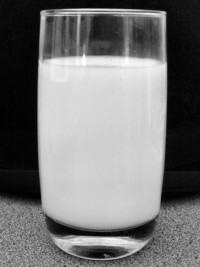If you are allergic to cows milk, choose a vegan diet, or prefer to limit your intake of dairy foods for whatever reason, here is how dairy milk compares to milk alternatives. Plant-based milks are more like “juice” than milk; hey are not a milk alternative. The exception is soy milk, because soy has high-quality protein. Soy milk is the best vegan alternative to dairy milk.
Enjoy nut milks as you desire, but just be aware they are a nutrient-poor choice—a poor choice for not only growing children, but also aging adults. (Protein needs increase as we go over the hill.) Most plant milks are fortified with calcium to match that in dairy. But nut-based milks lack protein. As you look at this chart, note:
- Lack of protein, as well as high-quality, muscle-building protein in milked nuts.
- Added sugars in the sweetened nut milks.
| Beverage, 8 oz. | Protein (g) | Calories | Sugar
Added (g) |
Fortification | Comments |
| Dairy milk, 1% fat | 8 | 110 | – | A, D | Naurally rich in calcium protein, and other life-sustaining nutrients |
| Almond milk, Silk
unsweetened |
1 | 30 | — | A, E, D, Calcium | Very low in protein and natural nutrients |
| Almond Milk, Silk
vanilla |
1 | 90 | 16 | A, E, D, B-12
B-2, zinc, Calcium |
60 calories of added sugar. Just take a vitamin pill instead? |
| Soy milk, Silk
unsweetened |
7 | 80 | – | Calcium, A, D, B-2, B-12 | Good source of high- quality protein |
| Soy milk, Silk
Vanilla |
6 | 100 | 9 | Calcium, A, D, B2, B12 | Better source of protein than nut milk |


How about the issue with dairy causing inflammation?
If you look at the research (see below), you’ll see that dairy is generally health-protective. Inflammation could be a problem for people who are allergic to milk (but that’s not everyone).
Milk and dairy products: good or bad for human health? An assessment of the totality of scientific evidence.
Thorning TK1, Raben A1, Tholstrup T1, Soedamah-Muthu SS2, Givens I3, Astrup A4.
Author information
1
Department of Nutrition, Exercise and Sports, Faculty of Science, University of Copenhagen, Copenhagen, Denmark.
2
Division of Human Nutrition, Wageningen University, Wageningen, The Netherlands.
3
Centre for Food, Nutrition and Health, University of Reading, Reading, UK.
4
Department of Nutrition, Exercise and Sports, Faculty of Science, University of Copenhagen, Copenhagen, Denmark; ast@nexs.ku.dk.
Abstract
BACKGROUND:
There is scepticism about health effects of dairy products in the public, which is reflected in an increasing intake of plant-based drinks, for example, from soy, rice, almond, or oat.
OBJECTIVE:
This review aimed to assess the scientific evidence mainly from meta-analyses of observational studies and randomised controlled trials, on dairy intake and risk of obesity, type 2 diabetes, cardiovascular disease, osteoporosis, cancer, and all-cause mortality.
RESULTS:
The most recent evidence suggested that intake of milk and dairy products was associated with reduced risk of childhood obesity. In adults, intake of dairy products was shown to improve body composition and facilitate weight loss during energy restriction. In addition, intake of milk and dairy products was associated with a neutral or reduced risk of type 2 diabetes and a reduced risk of cardiovascular disease, particularly stroke. Furthermore, the evidence suggested a beneficial effect of milk and dairy intake on bone mineral density but no association with risk of bone fracture. Among cancers, milk and dairy intake was inversely associated with colorectal cancer, bladder cancer, gastric cancer, and breast cancer, and not associated with risk of pancreatic cancer, ovarian cancer, or lung cancer, while the evidence for prostate cancer risk was inconsistent. Finally, consumption of milk and dairy products was not associated with all-cause mortality. Calcium-fortified plant-based drinks have been included as an alternative to dairy products in the nutrition recommendations in several countries. However, nutritionally, cow’s milk and plant-based drinks are completely different foods, and an evidence-based conclusion on the health value of the plant-based drinks requires more studies in humans.
CONCLUSION:
The totality of available scientific evidence supports that intake of milk and dairy products contribute to meet nutrient recommendations, and may protect against the most prevalent chronic diseases, whereas very few adverse effects have been reported.
Food Nutr Res. 2016 Nov 22;60:325
https://www.ncbi.nlm.nih.gov/pubmed/27882862
Interesting! Thanks for sharing Nancy!